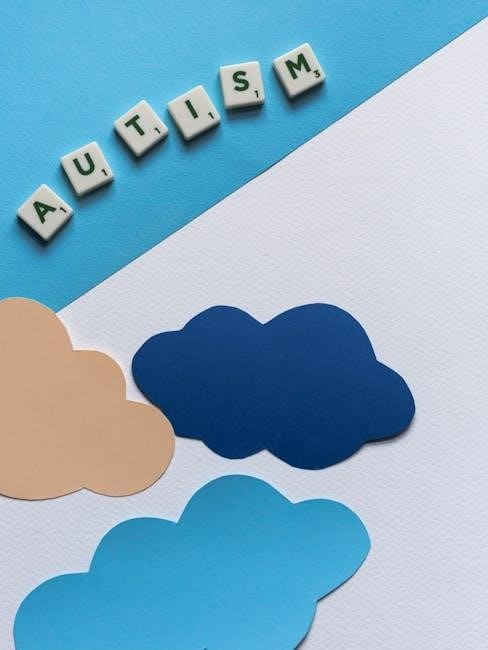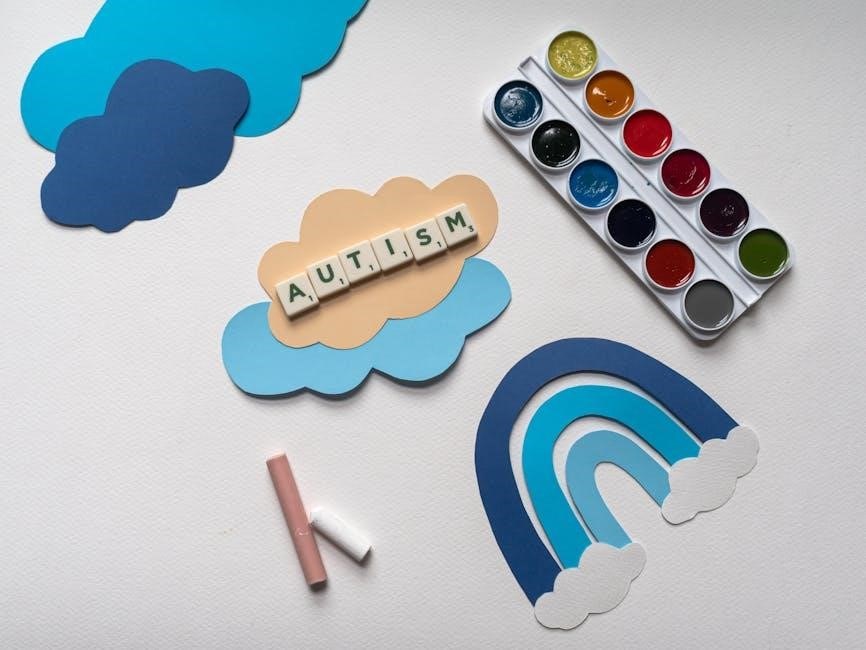Life skills are essential for individuals with autism to enhance independence, daily functioning, and social interactions. They empower individuals to navigate everyday tasks, fostering confidence and self-reliance.
Why Are Life Skills Important for Individuals with Autism?
Life skills are crucial for individuals with autism as they promote independence, confidence, and the ability to navigate daily challenges. These skills help individuals manage tasks like personal hygiene, meal preparation, and time management, reducing reliance on others. They also foster social interactions and communication, enabling individuals to build relationships and integrate into their communities. By mastering life skills, individuals with autism can enhance their self-esteem, mental well-being, and overall quality of life. These foundational abilities are vital for achieving autonomy and thriving in both personal and professional environments, making them a cornerstone of support for those on the autism spectrum.
Overview of Key Life Skills for Autism

Key life skills for autism encompass a range of abilities essential for daily living and independence. These include practical skills like personal hygiene, food preparation, and household management. Social and communication skills, such as understanding cues and building relationships, are also vital. Time management, financial literacy, and navigation are critical for independent living. Additionally, emotional well-being and self-advocacy are important for mental health. These skills are tailored to individual needs, helping individuals with autism thrive in various settings and fostering a sense of accomplishment and self-reliance. Together, they form a comprehensive foundation for a fulfilling and independent life.

Essential Life Skills for Daily Living
Mastering daily living skills, such as personal hygiene, food preparation, and household management, is crucial for independence. These skills build confidence and enable individuals with autism to manage daily tasks effectively.
Personal Hygiene and Self-Care
Personal hygiene and self-care are foundational life skills for individuals with autism, promoting health and confidence. These skills include bathing, handwashing, brushing teeth, and using the restroom independently. Teaching these routines can involve visual schedules, step-by-step instructions, and positive reinforcement. Parents and caregivers play a crucial role in modeling and reinforcing these practices. Consistency and patience are key, as some individuals may initially resist or struggle with these tasks. Mastering personal hygiene fosters independence, self-esteem, and better integration into social and community settings, making it a priority in life skills training for autism.
Food Preparation and Meal Planning
Food preparation and meal planning are vital life skills for individuals with autism, fostering independence and self-sufficiency. These skills involve grocery shopping, meal planning, cooking, and cleaning up. Breaking tasks into manageable steps, using visual aids, and providing clear instructions can help individuals learn effectively. Positive reinforcement and hands-on practice are key to building confidence. Tools like visual recipes or meal planning charts can simplify the process. Mastery of these skills not only enhances daily living but also promotes healthy eating habits and reduces reliance on others. It empowers individuals to make nutritious choices and enjoy the satisfaction of preparing their own meals.
Laundry and Household Management
Laundry and household management are fundamental life skills that promote independence and responsibility. Individuals with autism can learn to sort clothes, operate washing machines, and fold items with structured guidance. Breaking tasks into clear, manageable steps and using visual aids can enhance understanding. Teaching household management skills, such as tidying up or setting a daily routine, helps create a sense of order and accomplishment. These skills not only improve daily functioning but also foster self-reliance and confidence, enabling individuals to maintain a clean and organized living environment independently. Consistent practice and positive reinforcement are key to mastering these essential tasks.

Social and Communication Skills
Social and communication skills are vital for building relationships and interacting effectively. Strategies include verbal and non-verbal methods, understanding cues, and fostering connections for personal and professional growth.
Verbal and Non-Verbal Communication Strategies
Effective communication involves both verbal and non-verbal methods. Verbal strategies include using clear, concise language and active listening. Non-verbal strategies incorporate gestures, facial expressions, and visual aids like pictures or schedules. These approaches help individuals with autism express needs, wants, and emotions. Techniques such as speech therapy, role-playing, and augmentative communication devices can enhance these skills. Understanding and implementing these strategies fosters better interactions and relationships, promoting independence and confidence in social settings.
Understanding Social Cues and Interactions
Understanding social cues and interactions is crucial for individuals with autism to navigate relationships and community environments. Social cues, such as facial expressions, body language, and tone of voice, often go unnoticed or are misunderstood. Strategies like visual supports, social stories, and role-playing can help individuals interpret and respond appropriately. Encouraging real-life practice and peer interactions fosters confidence and competence. Recognizing unwritten social rules and developing emotional intelligence are key to building meaningful connections. These skills not only improve communication but also reduce anxiety and isolation, promoting a more inclusive and supportive social environment for individuals with autism.
Building and Maintaining Relationships

Building and maintaining relationships is vital for individuals with autism to foster emotional connections and a sense of belonging. Initiating and sustaining interactions can be challenging, but strategies like active listening, clear communication, and empathy can help. Encouraging shared interests and collaborative activities strengthens bonds. Teaching how to express emotions and interpret others’ feelings promotes deeper understanding. Providing emotional support and positive reinforcement helps individuals feel valued. Building trust through consistency and patience is key. These skills empower individuals with autism to form meaningful relationships, reducing feelings of isolation and enhancing overall well-being. Strong relationships also provide a support system for life’s challenges.
Independent Living and Community Integration
Mastering daily routines, time management, and financial literacy empowers individuals with autism to live independently and actively participate in their communities, fostering self-reliance and societal integration.
Time Management and Daily Routines
Establishing consistent routines and effective time management is crucial for individuals with autism. Structured schedules help reduce anxiety and improve task completion. Visual aids like charts or apps can guide daily planning, ensuring tasks are prioritized and completed efficiently. Teaching time estimation and task segmentation enables individuals to manage their time better. Consistency in routines fosters a sense of predictability, which is comforting for many autistic individuals. These skills are foundational for independent living, academic success, and workplace readiness, promoting overall well-being and self-sufficiency.
Handling Money and Financial Literacy
Mastering money management and financial literacy is vital for independence. Individuals with autism can learn to budget, save, and make purchases through structured teaching methods. Visual aids, such as charts or apps, can simplify complex concepts like price comparison and budget tracking. Practicing real-life scenarios, like grocery shopping or using an ATM, builds confidence. Understanding the value of money and the importance of saving helps individuals make informed financial decisions. These skills empower autonomy in daily life, reducing reliance on others for financial tasks and fostering long-term self-sufficiency.
Navigation and Transportation Skills
Navigation and transportation skills are crucial for independence, enabling individuals with autism to move safely and confidently in their community. Learning to use public transportation, read maps, and understand traffic rules can be challenging but is achievable with practice. Visual aids, such as schedules or GPS apps, can help simplify complex tasks. Practicing real-life scenarios, like riding a bus or crossing streets, builds familiarity and reduces anxiety. For some, sensory sensitivities may require additional strategies, such as noise-canceling headphones, to make travel more comfortable. These skills foster autonomy, allowing individuals to access social, educational, and employment opportunities independently.

Education and Employment Readiness
Education and employment readiness empowers individuals with autism to thrive academically and professionally. Transition support, job readiness programs, and workplace accommodations ensure successful integration and sustained growth.
Transitioning to Postsecondary Education
Transitioning to postsecondary education is a critical phase for individuals with autism, requiring tailored support to ensure academic and personal success. This process involves assessing individual strengths, identifying challenges, and developing strategies to overcome them. Key areas of focus include academic preparedness, self-advocacy, and social skills. Many colleges offer specialized programs and accommodations, such as note-takers, extended deadlines, and mental health support, to facilitate a smooth transition. Additionally, building a support network, including advisors, mentors, and peer groups, is essential. Early planning and collaboration with educators and families can significantly enhance the likelihood of a successful and fulfilling postsecondary experience.
Job Readiness and Employment Opportunities
Job readiness and employment opportunities are vital for individuals with autism to achieve independence and self-sufficiency. Tailored programs focus on developing workplace skills, such as communication, time management, and task completion. Employers are increasingly recognizing the unique strengths and contributions of autistic employees. Many organizations offer autism-specific hiring initiatives, providing accommodations like sensory-friendly environments and clear communication practices. Collaboration between job coaches, employers, and individuals ensures a supportive transition into the workforce. By fostering inclusive hiring practices and providing necessary accommodations, society can unlock the potential of autistic individuals, enabling them to thrive in diverse career paths and contribute meaningfully to their communities.
Support Systems for Students and Employees with Autism
Support systems are crucial for helping students and employees with autism thrive in educational and workplace settings. These systems often include accommodations like sensory-friendly environments, assistive technologies, and clear communication strategies. Mentorship programs, job coaches, and autism-specific training for employers can foster inclusion and understanding. Additionally, collaboration between educators, employers, and support staff ensures consistent and effective support. Encouraging self-advocacy and providing access to counseling services further empowers individuals with autism to navigate challenges confidently. By implementing these support systems, we create environments that promote growth, inclusion, and success for autistic individuals in both academic and professional contexts.
Mental Health and Emotional Well-being
Mental health is crucial for individuals with autism, addressing challenges like masking, sensory sensitivities, and stress. Coping mechanisms and self-advocacy promote emotional resilience and overall well-being effectively.

Masking and Its Impact on Mental Health
Masking, or camouflaging, is a common strategy where autistic individuals hide their true selves to fit societal norms. This can lead to mental health challenges like anxiety, burnout, and low self-esteem. Research shows that prolonged masking often results in emotional exhaustion and stress, as individuals struggle to maintain a facade. It can also hinder authentic relationships and self-acceptance. Understanding the impact of masking is vital for providing support and fostering an environment where autistic individuals feel safe to be themselves, reducing the pressure to conform and promoting mental well-being. Addressing this issue is crucial for improving their quality of life.

Coping Mechanisms and Stress Management
Coping mechanisms and stress management are vital for individuals with autism to navigate daily challenges. Techniques like sensory integration tools, structured routines, and emotional regulation strategies can help reduce anxiety. Encouraging physical activities, such as exercise or walking, can also alleviate stress. Additionally, creative outlets like writing, drawing, or journaling provide healthy ways to express emotions. Teaching problem-solving skills and offering a supportive environment can empower individuals to manage stress effectively. Implementing these strategies fosters resilience, improves mental well-being, and enhances overall quality of life, helping autistic individuals thrive in various settings.
Importance of Self-Advocacy and Acceptance
Self-advocacy and acceptance are crucial for individuals with autism to embrace their identity and thrive. Self-advocacy empowers them to express their needs, preferences, and boundaries, fostering personal growth and confidence. Acceptance, both self and societal, promotes a positive self-image and reduces stigma. Encouraging individuals to advocate for themselves helps them navigate challenges and assert their rights. Societal acceptance creates inclusive environments where autistic individuals can feel valued and supported. Together, self-advocacy and acceptance pave the way for a more fulfilling and inclusive life, enabling individuals with autism to reach their full potential and live authentically.





